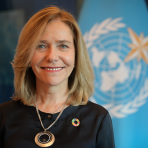Opening Remarks for EW4All Briefing
Ladies and gentlemen, colleagues, and partners,
Thank you for joining us today. It’s a privilege to be part of this collective journey, one that is as ambitious as it is necessary: delivering Early Warnings for All.
As we keep saying. Early warnings work. They must work for everyone.
We are making great progress to save lives, protect livelihoods, and strengthen resilience, across countries and communities.
We are seeing improvements across the globe, and along the entire value chain. From monitoring and forecasting to the communication of actionable information to those at risk.
Today, 108 countries report strengthened early warning systems with significant progress made in LDCs, LLDCs and SIDS—a testament to global commitment and collective action.
The success stories are too many to detail all of them today. But just to give you some examples:
- Bangladesh, Chad, Laos, Madagascar, Maldives and Nepal are now sharing new Earth observations.
- Most of the African continent and all Pacific SIDS countries have strengthened observational technical capacities.
- Impact based forecasts are a welcome new reality in a growing number of countries in Africa and Asia-Pacific, thanks to dedicated training and technical support. This means that communities receive information on what the weather will be and what it will DO.
- More than 20 African countries have new, improved websites and are now using – or getting ready to use – the Common Alerting Protocol for warnings.
You will hear more details of our achievements later.
But we need to go further, and we need to go faster. We must broaden the tent and level the playing field.
2024 was the hottest year on record, at 1.55 °C above the pre-industrial era. Each additional fraction of a degree of warming increases the economic and social damage to our communities. We saw this repeatedly in the past year, with rapidly intensifying tropical cyclones, devastating rainfall and flooding, and deadly drought and wildfires. The impacts continue long after the media headlines.
Extreme weather events top the list of risks over the next ten years in the World Economic Forum’s latest Global Risks Report. I was in Davos last week and this was a recurring theme of so many discussions and dialogues.
My few days in Davos confirmed to me the imperative of doing more to reach out to the business sector. Achieving Early Warnings for All is a global challenge that will not be possible without the vast and innovative capabilities of businesses.
Let me make it clear. Government agencies, notably National Meteorological and Hydrological Services, must remain the source of authoritative warnings. But the private sector has huge potential to create added value, from cutting-edge AI-driven models for better risk knowledge to enhanced warning dissemination and communication.
A joint report with WMO and the World Economic Forum found that one of the barriers to greater business involvement is lack of clear governance, guidance and enabling policies from governments. WMO will therefore be enhancing assistance to its Members to promote public-private engagement.
We are also actively reaching out to other partners across governments, local communities, civil society, academia, and the international community.
Global vulnerabilities are growing, yet resources are finite. We must align our collective efforts, further reduce duplication and break down silos. This will help us fill gaps and mobilize resources to meet country needs better and faster.
To accomplish this, WMO’s priorities in the upcoming year will therefore be to leverage partnerships and technologies, including AI. We want to further enhance forecasting capabilities, global observation systems and data sharing across borders. For this we are grateful for support from financial instruments, like the Climate Risk and Early Warning Systems Initiative, the Systematic Observation Financing Facility and others.
We all share a common vision of wellbeing, adaptation, security and resilience. Early warning systems save lives, safeguard futures, and empower communities. Now more than ever, it is our responsibility to deliver on our promise.
Let’s use today’s briefing as an opportunity to ask the difficult questions and challenge ourselves to think bigger, act bolder, and collaborate better. Together, we can turn the vision of Early Warnings for All into a reality that leaves no one behind.
Thank you.
Closing Remarks for EW4All Briefing
Ladies and gentlemen, colleagues, and partners,
As we close, let’s reflect on the path ahead. The EW4All initiative is a clear example of what’s possible when funding, resources, capacities, and technologies align under a shared goal and approach. This collective effort is how we will deliver on the ambitious target set for 2027.
While we are early in the year, now is the time to think about the journey ahead— as our time to 2027 is short. COP30 in Belém will be a critical moment to deliver on global commitments around finance, loss and damage, adaptation, and NDCs. Early Warnings for All can play a central role in advancing these priorities. Our collective effort will drive resilience, wellbeing, and action where it matters most.
What we heard today from Member States should strengthen our resolve to the 2027 goal of protecting everyone on earth with early warnings. Together, we can push EW4All to not only meet its goals but to move the needle across the broader commitments the world is counting on us to achieve.
Thank you for your time, insights, and dedication. Let’s carry this momentum forward and make early warnings a reality for everyone, everywhere.
Statement by


